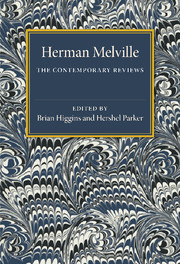Book contents
- Frontmatter
- Contents
- Series Editor's Preface
- Introduction
- AMERICAN CRITICAL ARCHIVES 6
- Typee (1846)
- Omoo (1847)
- Mardi (1849)
- Redburn (1849)
- White-Jacket (1850)
- Moby-Dick (1851)
- Pierre (1852)
- Israel Potter (1855)
- The Piazza Tales (1856)
- The Confidence-Man (1857)
- Battle-Pieces and Aspects of the War (1866)
- Clarel (1876)
- John Marr and Other Sailors with Some Sea-Pieces (1888)
- Billy Budd (posthumous)
- Index
Redburn (1849)
Published online by Cambridge University Press: 01 April 2010
- Frontmatter
- Contents
- Series Editor's Preface
- Introduction
- AMERICAN CRITICAL ARCHIVES 6
- Typee (1846)
- Omoo (1847)
- Mardi (1849)
- Redburn (1849)
- White-Jacket (1850)
- Moby-Dick (1851)
- Pierre (1852)
- Israel Potter (1855)
- The Piazza Tales (1856)
- The Confidence-Man (1857)
- Battle-Pieces and Aspects of the War (1866)
- Clarel (1876)
- John Marr and Other Sailors with Some Sea-Pieces (1888)
- Billy Budd (posthumous)
- Index
Summary
Literary Gazette [London], 1709 (20 October 1849), 776-78.
Let any author be only flighty enough, be it in imaginary travels or in poetry, there are sure to be a set of critical writers who can twist systems out of their absurdities, and discover the most recondite lessons of truth in their imbecilities. Like folks sitting round the fire, it is wonderful what extraordinary things they can make out of the bits of coal and cinders, or, like higher speculators, who take the clouds for their “suggestive” sapience, it is really pleasant to hear them confess the striking resemblances to angels, whales, or aught else in or out of nature. It glorifies a fellow not only to pretend to understand what nobody else comprehends, but even to find in it some astounding purpose and deep philosophical execution that escape all human discernment but their own. And then to explain and demonstrate this in a manner which renders the palpable obscure yet more impenetrably dark, till the awestruck world are half convinced that there must be something immensely profound in the mystery, and, though they cannot see it, that a glorious and immortal light has dawned upon the conscious earth.
A good deal of this sort of interpretation has, we think, been bestowed on Mr. Melville, and wherever he was the most extravagant, his admirers made out that he had the most natural meaning.
- Type
- Chapter
- Information
- Herman MelvilleThe Contemporary Reviews, pp. 253 - 292Publisher: Cambridge University PressPrint publication year: 1995

